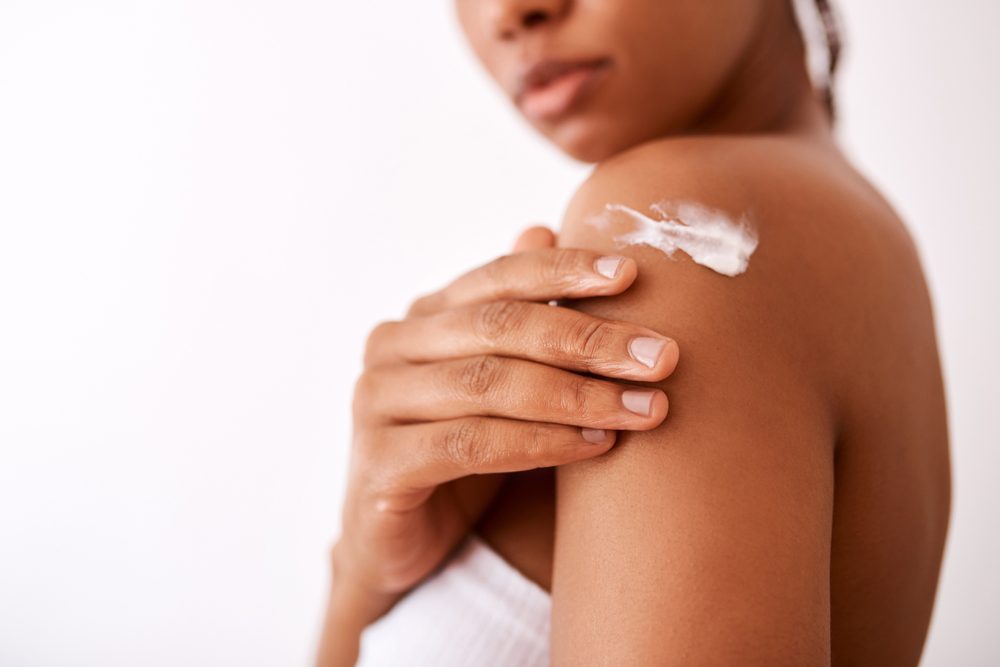
How to Get Rid of Eczema Scarring
Eczema flare-ups are extremely irritating. This constant need to scratch can disrupt daily life, but it can also affect skin health. Sometimes, severe itching can cause eczema scars like dark spots, uneven texture or noticeable lines. Keep reading to learn about the best eczema scar treatment and some self-help tips to help keep your skin smooth and healthy.
What Causes Eczema Scars?
No matter what type of eczema you have, there’s always the risk of scarring. Eczema scarring happens due to incessant, intense scratching, causing the skin to cut open and bleed. Not only that, but the inflammation disrupts the normal wound-healing processes of the skin, leading to changes in skin texture and colour, leaving scars varying in appearance.
Types of eczema scars
- Hyperpigmentation – This common type of eczema scar appears as dark patches on the skin where flare-ups are most intense.
- Atrophic Scars – Prolonged inflammation can cause the skin to thin out, creating depressions or indentations, known as atrophic scars.
Factors influencing scarring
✓ Severity of eczema – More severe and poorly managed eczema is more likely to leave scars due to intense inflammation and frequent scratching.
✓ Skin colour – Individuals with darker skin are more prone to hyperpigmentation.
✓ Frequency – Repeated flare-ups in the same areas can increase the risk of scarring.
✓ Personal habits – The tendency to scratch or pick at eczema patches significantly disrupts the healing process.
Preventing Eczema Scars
Preventing eczema scars starts with effective management of eczema flare-ups. By reducing the frequency and severity of these uncomfortable episodes, you’ll decrease the likelihood of scarring.
Here are some helpful strategies to help prevent eczema scars:
- Moisturise regularly – Eczema and dry skin go hand in hand – so keeping the skin hydrated is crucial! Use ointments and creams formulated for eczema-prone skin to lock in moisture and protect the skin barrier.
- Control inflammation – Corticosteroids or newer non-steroidal topical creams like calcineurin inhibitors can help control the inflammation and itching associated with eczema.
- Trigger avoidance – Healing eczema scars begin with preventative measures. So identify and avoid personal triggers such as allergens, irritants like regular fragrance-filled soaps and environmental factors like extreme temperatures.
- Keep nails short – Short nails cause less skin damage when scratching does occur.
- Use anti-itch treatments – Applying OTC anti-itch creams or prescribed medications when feeling itchy can stop the urge before it gets worse.
- Wear comfortable clothing – Soft fabrics that breathe well, like cotton, can prevent irritation and overheating, which might make you feel extra itchy.
- Use suitable skincare products – Products designed for sensitive skin that contain skin-loving ceramides and are free of irritating fragrances and dyes can help strengthen your skin’s natural barrier.
- Consider wet wrap therapy – Applying wet wraps over moisturisers can soothe and hydrate the skin, reducing itching and inflammation during severe flare-ups.
- Dietary changes – Some people find that certain foods exacerbate their eczema. These can include dairy and glute. Try an elimination diet and keep a food diary to identify any correlations between your diet and your skin.
- Stress management – Since stress can trigger eczema flare-ups, incorporating stress-reduction techniques such as yoga, meditation or regular exercise can be beneficial.
The Best Eczema Scar Treatment
Once eczema scars have formed, there are several treatment strategies to reduce their appearance and improve the overall health of your skin, such as:
Topical treatments:
Hydroquinone
This skin-lightening agent is commonly used to treat hyperpigmentation. It works by reducing melanin production, which can help lighten dark scars.
Retinoids
Speak to a reputable dermatologist about topical retinoids. This will boost cell turnover to improve the texture and appearance of scarred skin. They are particularly effective for atrophic scars and can also help reduce hyperpigmentation.
Corticosteroid Creams
These can be used to reduce inflammation and are especially useful for raised and red hypertrophic scars.
Medical procedures:
Laser therapy
Laser treatments can be effective for both pigmentation issues and textural changes. Fractional laser therapy, for instance, can stimulate collagen production and resurface the skin, improving colour and smoothness.
Microneedling
When researching how to get rid of eczema scars, microneeding is top of the list. This procedure involves tiny needles that create micro-injuries in the skin, stimulating natural healing processes and collagen production. It’s particularly good for atrophic scars.
Chemical peels
This treatment removes the outer layer of the skin, helping to reduce the appearance of darker scars and promote even skin tone.
Natural remedies and home care
- Aloe Vera – Known for its healing properties, aloe vera can be applied to eczema scars to soothe and promote skin regeneration.
- Essential oils -Some essential oils, such as lavender and tea tree oil, can help heal scars naturally. They should always be used diluted in a carrier oil to avoid irritation.
- Bio-Oil – This over-the-counter product has been proven to reduce the appearance of scars over time.
Lifestyle
- Sun protection – Protecting scars from the sun is crucial, as UV exposure can darken scars and prolong the healing process. Using a broad-spectrum sunscreen with at least SPF 30 is essential.
- Healthy diet – A diet rich in vitamins and antioxidants can support skin health and aid in the healing eczema scars. For example, foods high in vitamin C can promote collagen production.
Healing Eczema Scars Together
Taking action against eczema scars improves your skin’s appearance, as well as your confidence and quality of life. Don’t let eczema scars define your skin’s story — options are available, and healing is within reach.
Ready to tackle your eczema scars? Contact DermConsult to schedule a consultation and discover the treatment options to rejuvenate your skin today.

